Systematic Review: Impact of COVID-19 Restrictions on Cancer Care
VerifiedAdded on 2023/06/16
|11
|3331
|442
Literature Review
AI Summary
This literature review systematically examines the impact of COVID-19 restrictions on diagnostic and treatment outcomes in cancer care. Utilizing the PICO framework, the review analyzes studies published after 2020, focusing on the effects of pandemic-related limitations on cancer diagnosis, treat...
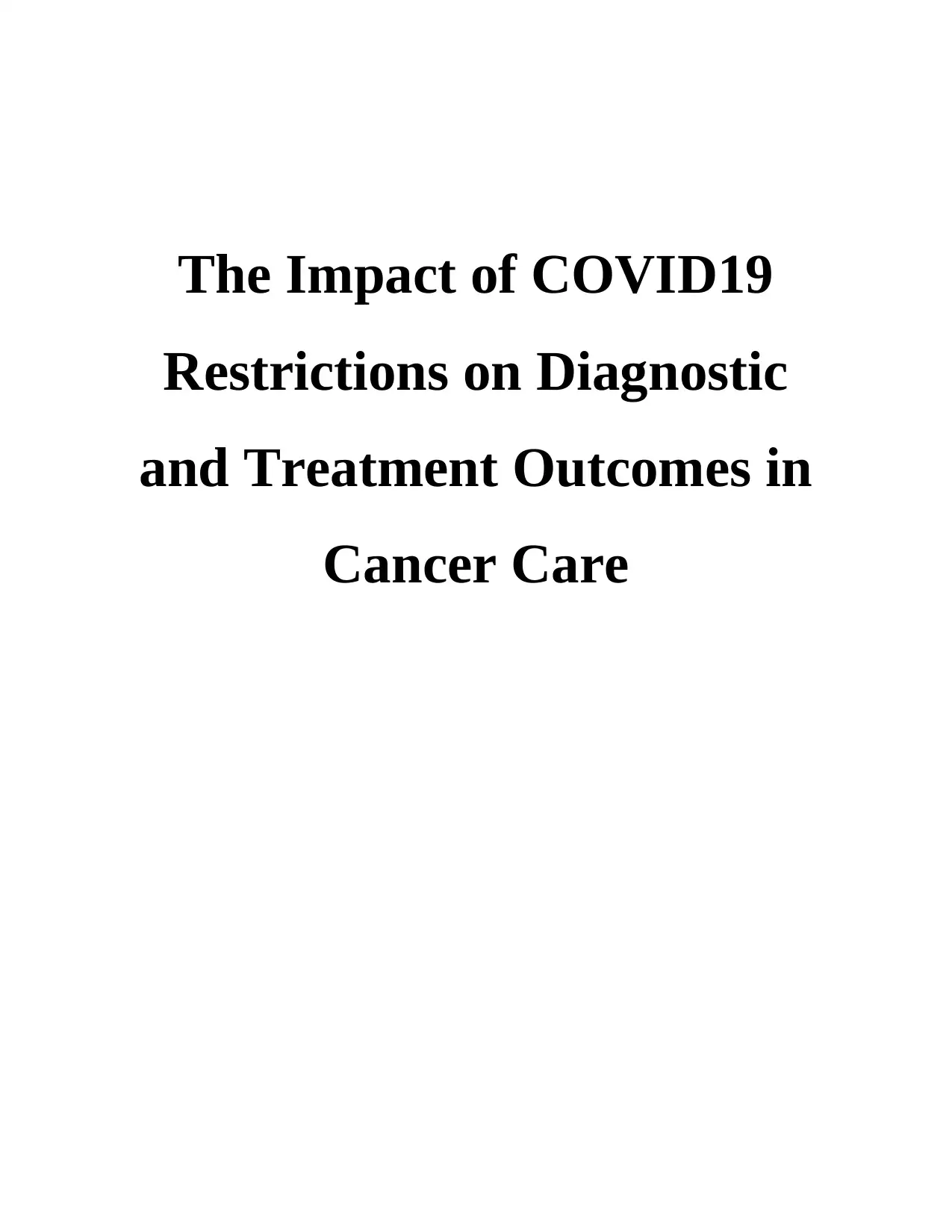
The Impact of COVID19
Restrictions on Diagnostic
and Treatment Outcomes in
Cancer Care
Restrictions on Diagnostic
and Treatment Outcomes in
Cancer Care
Paraphrase This Document
Need a fresh take? Get an instant paraphrase of this document with our AI Paraphraser
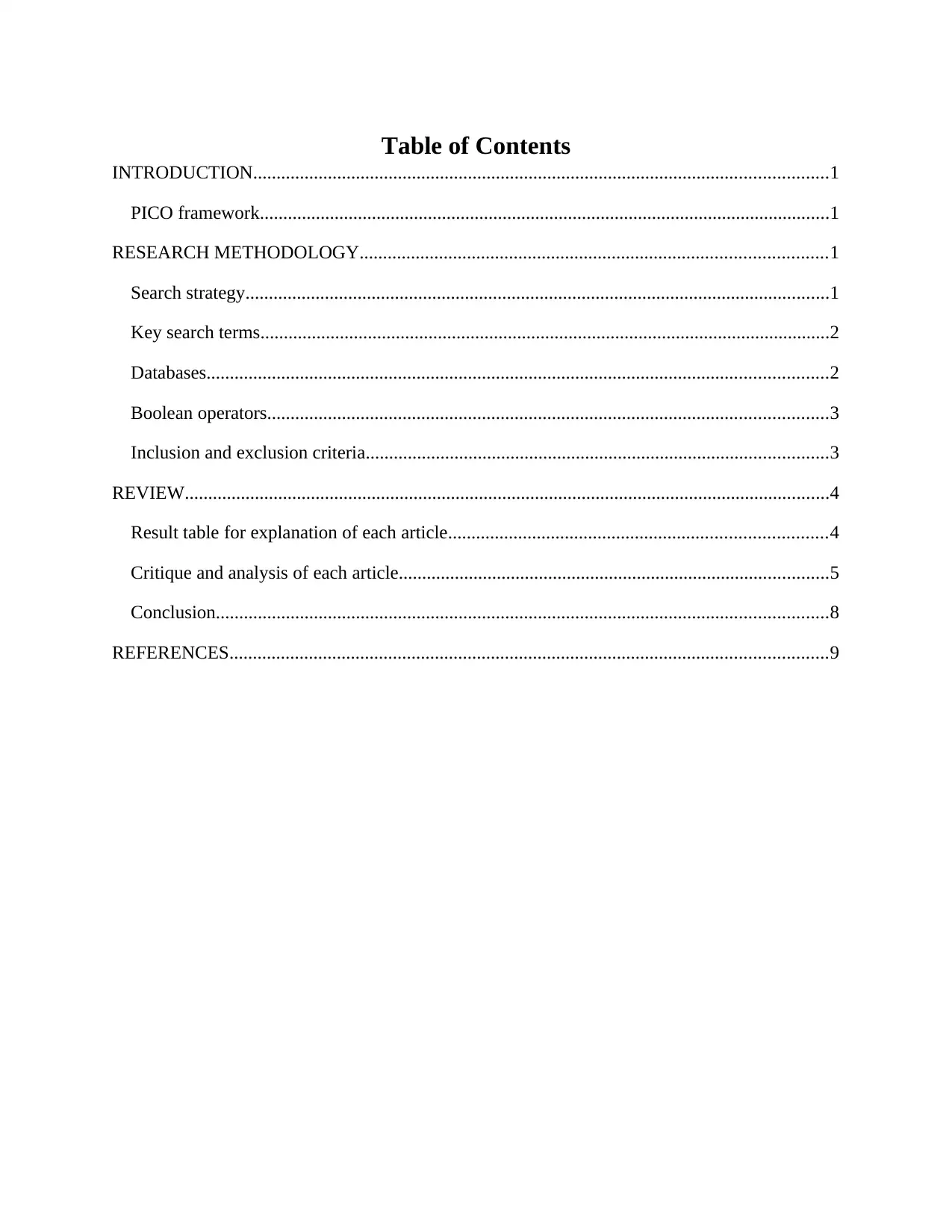
Table of Contents
INTRODUCTION...........................................................................................................................1
PICO framework..........................................................................................................................1
RESEARCH METHODOLOGY....................................................................................................1
Search strategy.............................................................................................................................1
Key search terms..........................................................................................................................2
Databases.....................................................................................................................................2
Boolean operators........................................................................................................................3
Inclusion and exclusion criteria...................................................................................................3
REVIEW..........................................................................................................................................4
Result table for explanation of each article.................................................................................4
Critique and analysis of each article............................................................................................5
Conclusion...................................................................................................................................8
REFERENCES................................................................................................................................9
INTRODUCTION...........................................................................................................................1
PICO framework..........................................................................................................................1
RESEARCH METHODOLOGY....................................................................................................1
Search strategy.............................................................................................................................1
Key search terms..........................................................................................................................2
Databases.....................................................................................................................................2
Boolean operators........................................................................................................................3
Inclusion and exclusion criteria...................................................................................................3
REVIEW..........................................................................................................................................4
Result table for explanation of each article.................................................................................4
Critique and analysis of each article............................................................................................5
Conclusion...................................................................................................................................8
REFERENCES................................................................................................................................9
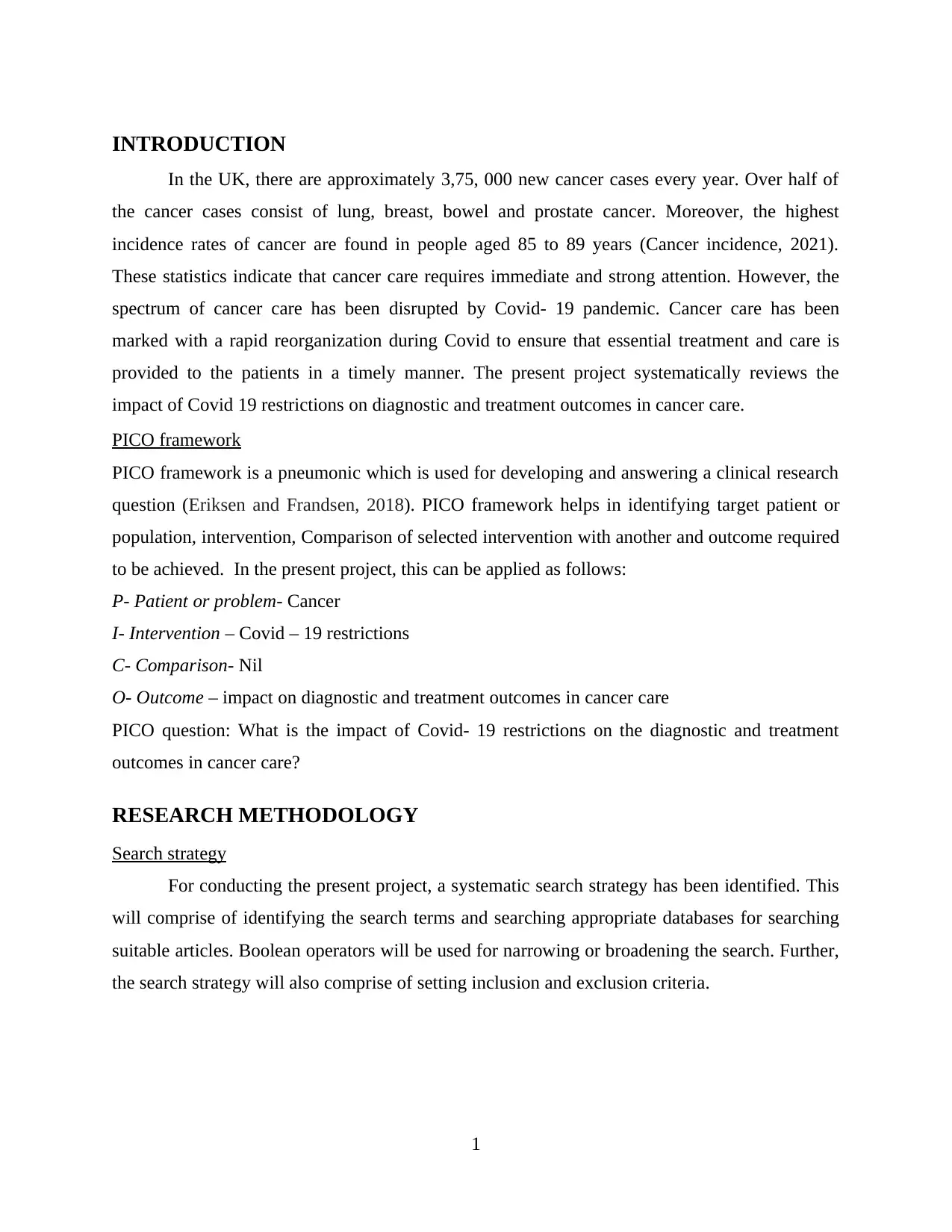
INTRODUCTION
In the UK, there are approximately 3,75, 000 new cancer cases every year. Over half of
the cancer cases consist of lung, breast, bowel and prostate cancer. Moreover, the highest
incidence rates of cancer are found in people aged 85 to 89 years (Cancer incidence, 2021).
These statistics indicate that cancer care requires immediate and strong attention. However, the
spectrum of cancer care has been disrupted by Covid- 19 pandemic. Cancer care has been
marked with a rapid reorganization during Covid to ensure that essential treatment and care is
provided to the patients in a timely manner. The present project systematically reviews the
impact of Covid 19 restrictions on diagnostic and treatment outcomes in cancer care.
PICO framework
PICO framework is a pneumonic which is used for developing and answering a clinical research
question (Eriksen and Frandsen, 2018). PICO framework helps in identifying target patient or
population, intervention, Comparison of selected intervention with another and outcome required
to be achieved. In the present project, this can be applied as follows:
P- Patient or problem- Cancer
I- Intervention – Covid – 19 restrictions
C- Comparison- Nil
O- Outcome – impact on diagnostic and treatment outcomes in cancer care
PICO question: What is the impact of Covid- 19 restrictions on the diagnostic and treatment
outcomes in cancer care?
RESEARCH METHODOLOGY
Search strategy
For conducting the present project, a systematic search strategy has been identified. This
will comprise of identifying the search terms and searching appropriate databases for searching
suitable articles. Boolean operators will be used for narrowing or broadening the search. Further,
the search strategy will also comprise of setting inclusion and exclusion criteria.
1
In the UK, there are approximately 3,75, 000 new cancer cases every year. Over half of
the cancer cases consist of lung, breast, bowel and prostate cancer. Moreover, the highest
incidence rates of cancer are found in people aged 85 to 89 years (Cancer incidence, 2021).
These statistics indicate that cancer care requires immediate and strong attention. However, the
spectrum of cancer care has been disrupted by Covid- 19 pandemic. Cancer care has been
marked with a rapid reorganization during Covid to ensure that essential treatment and care is
provided to the patients in a timely manner. The present project systematically reviews the
impact of Covid 19 restrictions on diagnostic and treatment outcomes in cancer care.
PICO framework
PICO framework is a pneumonic which is used for developing and answering a clinical research
question (Eriksen and Frandsen, 2018). PICO framework helps in identifying target patient or
population, intervention, Comparison of selected intervention with another and outcome required
to be achieved. In the present project, this can be applied as follows:
P- Patient or problem- Cancer
I- Intervention – Covid – 19 restrictions
C- Comparison- Nil
O- Outcome – impact on diagnostic and treatment outcomes in cancer care
PICO question: What is the impact of Covid- 19 restrictions on the diagnostic and treatment
outcomes in cancer care?
RESEARCH METHODOLOGY
Search strategy
For conducting the present project, a systematic search strategy has been identified. This
will comprise of identifying the search terms and searching appropriate databases for searching
suitable articles. Boolean operators will be used for narrowing or broadening the search. Further,
the search strategy will also comprise of setting inclusion and exclusion criteria.
1
⊘ This is a preview!⊘
Do you want full access?
Subscribe today to unlock all pages.

Trusted by 1+ million students worldwide
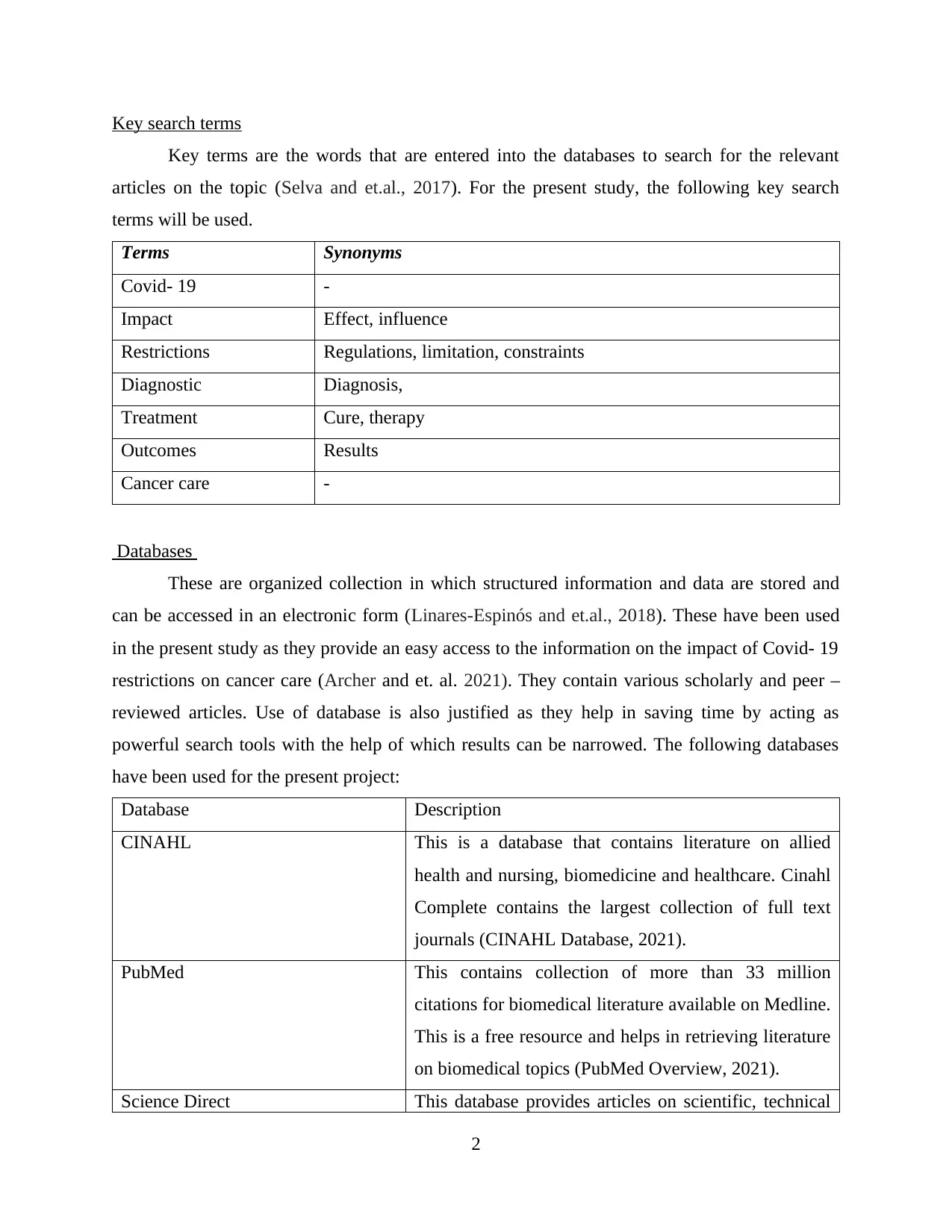
Key search terms
Key terms are the words that are entered into the databases to search for the relevant
articles on the topic (Selva and et.al., 2017). For the present study, the following key search
terms will be used.
Terms Synonyms
Covid- 19 -
Impact Effect, influence
Restrictions Regulations, limitation, constraints
Diagnostic Diagnosis,
Treatment Cure, therapy
Outcomes Results
Cancer care -
Databases
These are organized collection in which structured information and data are stored and
can be accessed in an electronic form (Linares-Espinós and et.al., 2018). These have been used
in the present study as they provide an easy access to the information on the impact of Covid- 19
restrictions on cancer care (Archer and et. al. 2021). They contain various scholarly and peer –
reviewed articles. Use of database is also justified as they help in saving time by acting as
powerful search tools with the help of which results can be narrowed. The following databases
have been used for the present project:
Database Description
CINAHL This is a database that contains literature on allied
health and nursing, biomedicine and healthcare. Cinahl
Complete contains the largest collection of full text
journals (CINAHL Database, 2021).
PubMed This contains collection of more than 33 million
citations for biomedical literature available on Medline.
This is a free resource and helps in retrieving literature
on biomedical topics (PubMed Overview, 2021).
Science Direct This database provides articles on scientific, technical
2
Key terms are the words that are entered into the databases to search for the relevant
articles on the topic (Selva and et.al., 2017). For the present study, the following key search
terms will be used.
Terms Synonyms
Covid- 19 -
Impact Effect, influence
Restrictions Regulations, limitation, constraints
Diagnostic Diagnosis,
Treatment Cure, therapy
Outcomes Results
Cancer care -
Databases
These are organized collection in which structured information and data are stored and
can be accessed in an electronic form (Linares-Espinós and et.al., 2018). These have been used
in the present study as they provide an easy access to the information on the impact of Covid- 19
restrictions on cancer care (Archer and et. al. 2021). They contain various scholarly and peer –
reviewed articles. Use of database is also justified as they help in saving time by acting as
powerful search tools with the help of which results can be narrowed. The following databases
have been used for the present project:
Database Description
CINAHL This is a database that contains literature on allied
health and nursing, biomedicine and healthcare. Cinahl
Complete contains the largest collection of full text
journals (CINAHL Database, 2021).
PubMed This contains collection of more than 33 million
citations for biomedical literature available on Medline.
This is a free resource and helps in retrieving literature
on biomedical topics (PubMed Overview, 2021).
Science Direct This database provides articles on scientific, technical
2
Paraphrase This Document
Need a fresh take? Get an instant paraphrase of this document with our AI Paraphraser
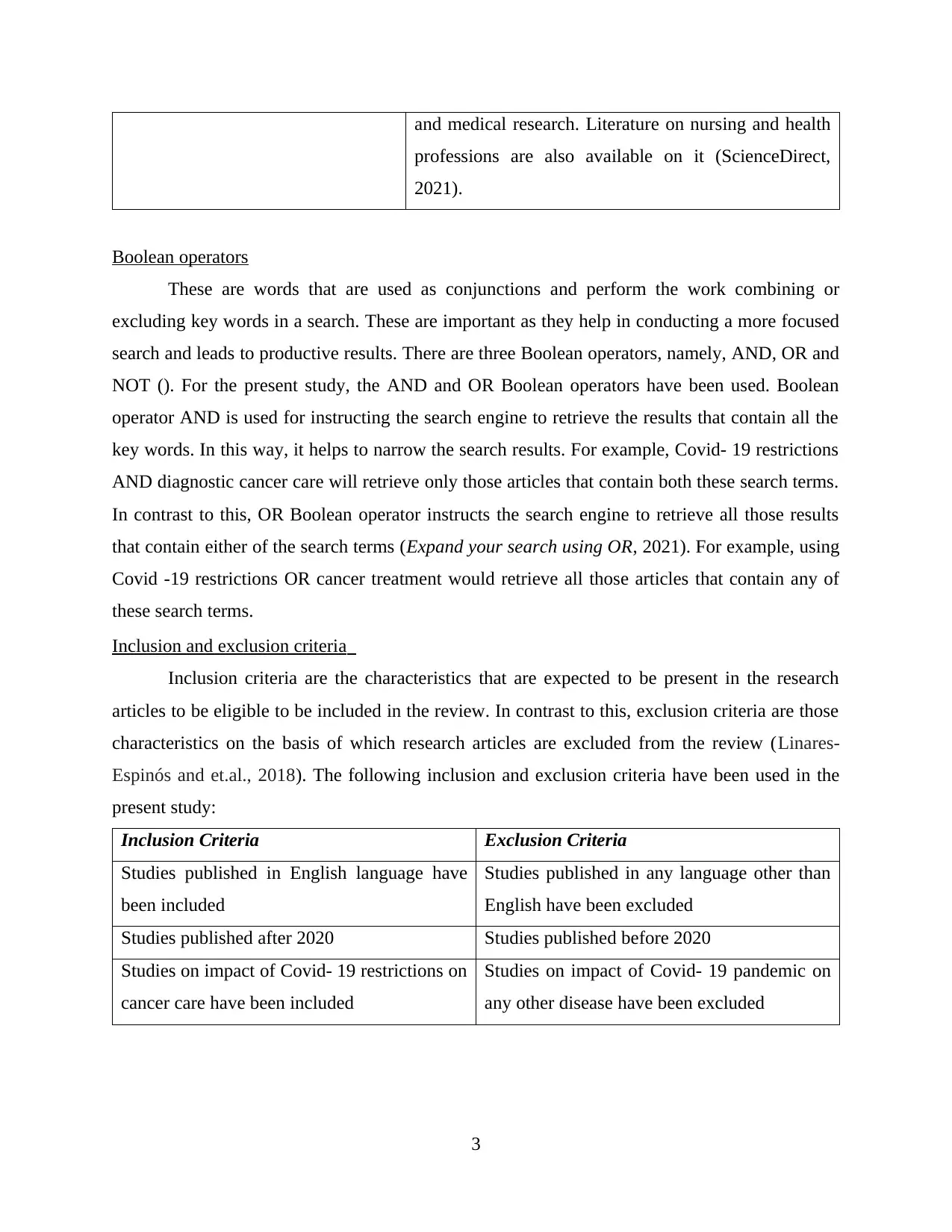
and medical research. Literature on nursing and health
professions are also available on it (ScienceDirect,
2021).
Boolean operators
These are words that are used as conjunctions and perform the work combining or
excluding key words in a search. These are important as they help in conducting a more focused
search and leads to productive results. There are three Boolean operators, namely, AND, OR and
NOT (). For the present study, the AND and OR Boolean operators have been used. Boolean
operator AND is used for instructing the search engine to retrieve the results that contain all the
key words. In this way, it helps to narrow the search results. For example, Covid- 19 restrictions
AND diagnostic cancer care will retrieve only those articles that contain both these search terms.
In contrast to this, OR Boolean operator instructs the search engine to retrieve all those results
that contain either of the search terms (Expand your search using OR, 2021). For example, using
Covid -19 restrictions OR cancer treatment would retrieve all those articles that contain any of
these search terms.
Inclusion and exclusion criteria
Inclusion criteria are the characteristics that are expected to be present in the research
articles to be eligible to be included in the review. In contrast to this, exclusion criteria are those
characteristics on the basis of which research articles are excluded from the review (Linares-
Espinós and et.al., 2018). The following inclusion and exclusion criteria have been used in the
present study:
Inclusion Criteria Exclusion Criteria
Studies published in English language have
been included
Studies published in any language other than
English have been excluded
Studies published after 2020 Studies published before 2020
Studies on impact of Covid- 19 restrictions on
cancer care have been included
Studies on impact of Covid- 19 pandemic on
any other disease have been excluded
3
professions are also available on it (ScienceDirect,
2021).
Boolean operators
These are words that are used as conjunctions and perform the work combining or
excluding key words in a search. These are important as they help in conducting a more focused
search and leads to productive results. There are three Boolean operators, namely, AND, OR and
NOT (). For the present study, the AND and OR Boolean operators have been used. Boolean
operator AND is used for instructing the search engine to retrieve the results that contain all the
key words. In this way, it helps to narrow the search results. For example, Covid- 19 restrictions
AND diagnostic cancer care will retrieve only those articles that contain both these search terms.
In contrast to this, OR Boolean operator instructs the search engine to retrieve all those results
that contain either of the search terms (Expand your search using OR, 2021). For example, using
Covid -19 restrictions OR cancer treatment would retrieve all those articles that contain any of
these search terms.
Inclusion and exclusion criteria
Inclusion criteria are the characteristics that are expected to be present in the research
articles to be eligible to be included in the review. In contrast to this, exclusion criteria are those
characteristics on the basis of which research articles are excluded from the review (Linares-
Espinós and et.al., 2018). The following inclusion and exclusion criteria have been used in the
present study:
Inclusion Criteria Exclusion Criteria
Studies published in English language have
been included
Studies published in any language other than
English have been excluded
Studies published after 2020 Studies published before 2020
Studies on impact of Covid- 19 restrictions on
cancer care have been included
Studies on impact of Covid- 19 pandemic on
any other disease have been excluded
3
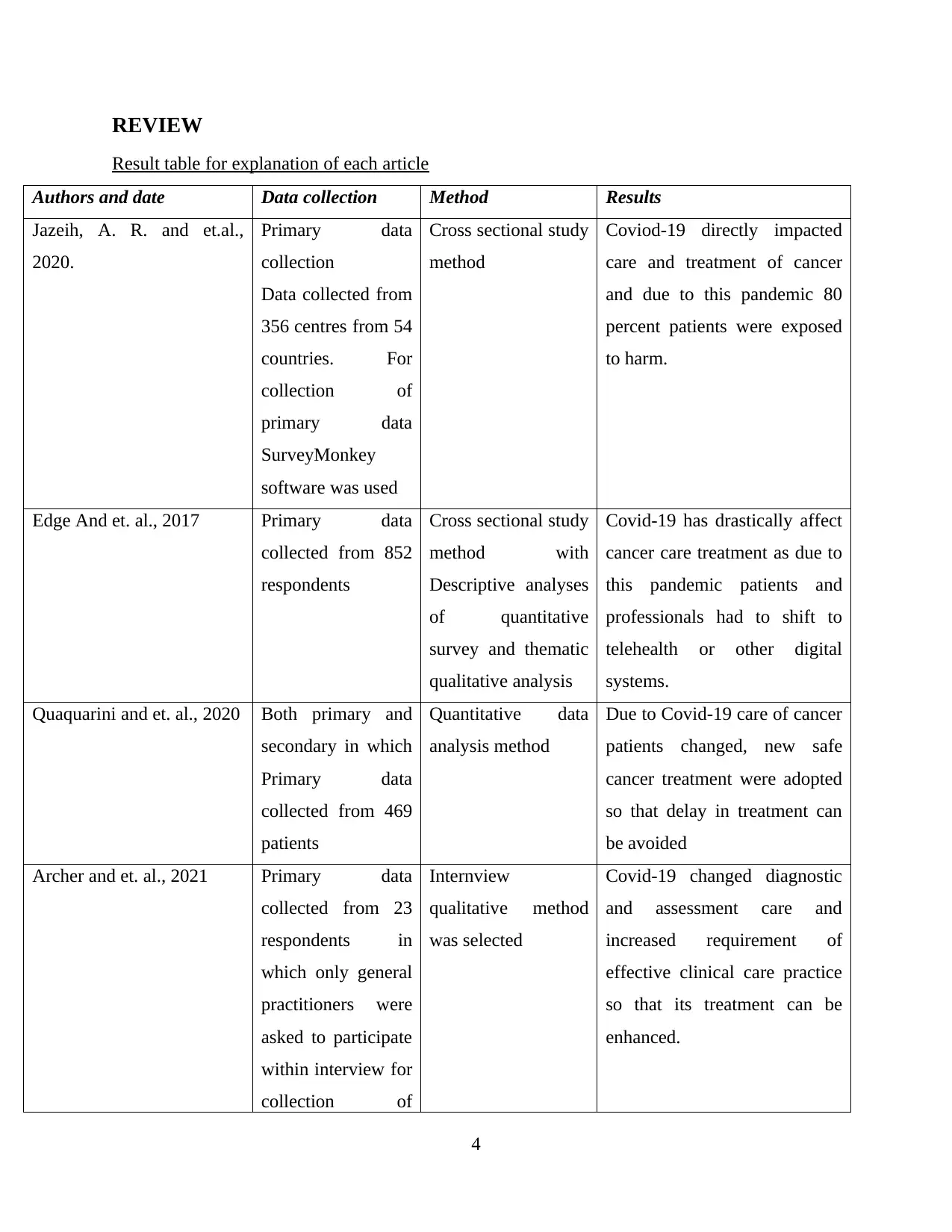
REVIEW
Result table for explanation of each article
Authors and date Data collection Method Results
Jazeih, A. R. and et.al.,
2020.
Primary data
collection
Data collected from
356 centres from 54
countries. For
collection of
primary data
SurveyMonkey
software was used
Cross sectional study
method
Coviod-19 directly impacted
care and treatment of cancer
and due to this pandemic 80
percent patients were exposed
to harm.
Edge And et. al., 2017 Primary data
collected from 852
respondents
Cross sectional study
method with
Descriptive analyses
of quantitative
survey and thematic
qualitative analysis
Covid-19 has drastically affect
cancer care treatment as due to
this pandemic patients and
professionals had to shift to
telehealth or other digital
systems.
Quaquarini and et. al., 2020 Both primary and
secondary in which
Primary data
collected from 469
patients
Quantitative data
analysis method
Due to Covid-19 care of cancer
patients changed, new safe
cancer treatment were adopted
so that delay in treatment can
be avoided
Archer and et. al., 2021 Primary data
collected from 23
respondents in
which only general
practitioners were
asked to participate
within interview for
collection of
Internview
qualitative method
was selected
Covid-19 changed diagnostic
and assessment care and
increased requirement of
effective clinical care practice
so that its treatment can be
enhanced.
4
Result table for explanation of each article
Authors and date Data collection Method Results
Jazeih, A. R. and et.al.,
2020.
Primary data
collection
Data collected from
356 centres from 54
countries. For
collection of
primary data
SurveyMonkey
software was used
Cross sectional study
method
Coviod-19 directly impacted
care and treatment of cancer
and due to this pandemic 80
percent patients were exposed
to harm.
Edge And et. al., 2017 Primary data
collected from 852
respondents
Cross sectional study
method with
Descriptive analyses
of quantitative
survey and thematic
qualitative analysis
Covid-19 has drastically affect
cancer care treatment as due to
this pandemic patients and
professionals had to shift to
telehealth or other digital
systems.
Quaquarini and et. al., 2020 Both primary and
secondary in which
Primary data
collected from 469
patients
Quantitative data
analysis method
Due to Covid-19 care of cancer
patients changed, new safe
cancer treatment were adopted
so that delay in treatment can
be avoided
Archer and et. al., 2021 Primary data
collected from 23
respondents in
which only general
practitioners were
asked to participate
within interview for
collection of
Internview
qualitative method
was selected
Covid-19 changed diagnostic
and assessment care and
increased requirement of
effective clinical care practice
so that its treatment can be
enhanced.
4
⊘ This is a preview!⊘
Do you want full access?
Subscribe today to unlock all pages.

Trusted by 1+ million students worldwide
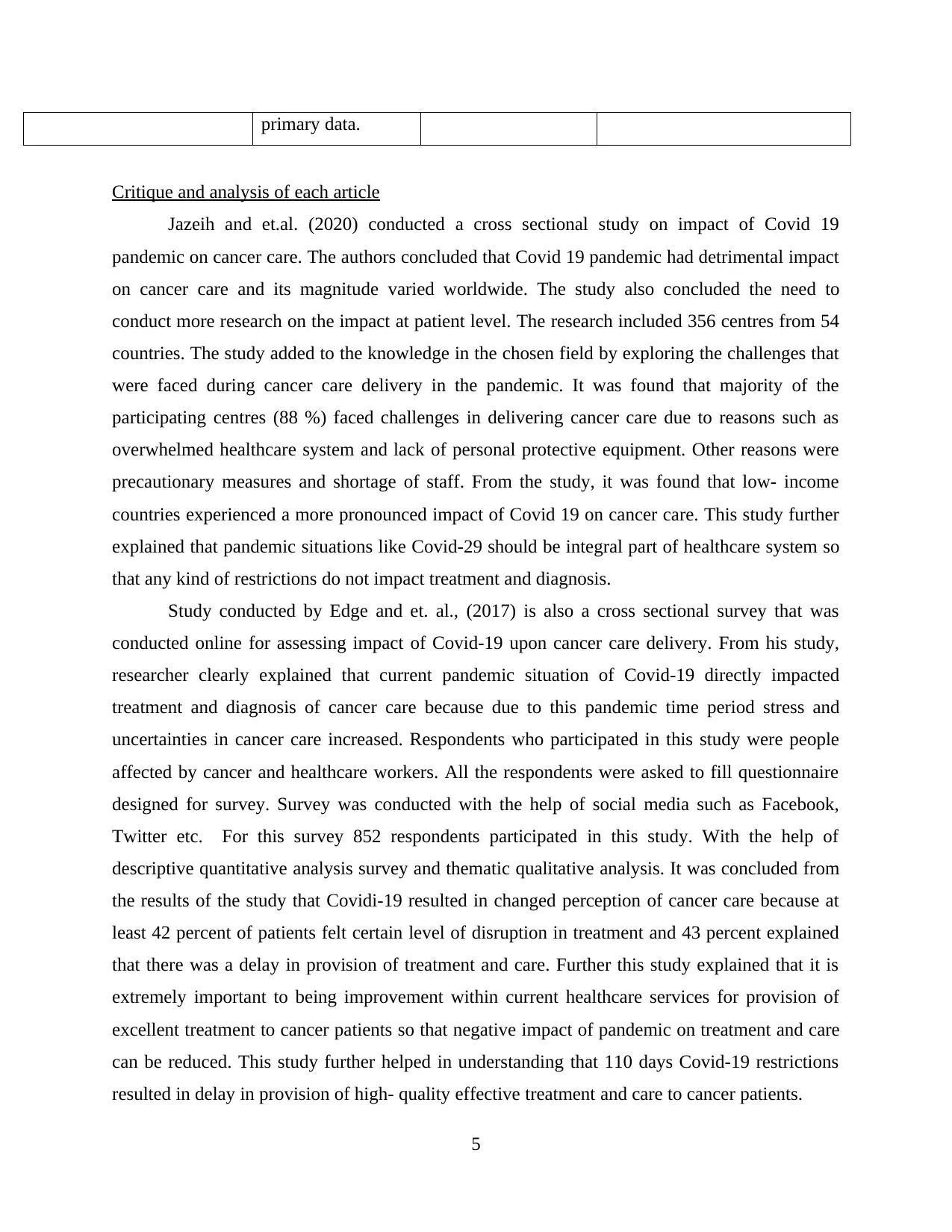
primary data.
Critique and analysis of each article
Jazeih and et.al. (2020) conducted a cross sectional study on impact of Covid 19
pandemic on cancer care. The authors concluded that Covid 19 pandemic had detrimental impact
on cancer care and its magnitude varied worldwide. The study also concluded the need to
conduct more research on the impact at patient level. The research included 356 centres from 54
countries. The study added to the knowledge in the chosen field by exploring the challenges that
were faced during cancer care delivery in the pandemic. It was found that majority of the
participating centres (88 %) faced challenges in delivering cancer care due to reasons such as
overwhelmed healthcare system and lack of personal protective equipment. Other reasons were
precautionary measures and shortage of staff. From the study, it was found that low- income
countries experienced a more pronounced impact of Covid 19 on cancer care. This study further
explained that pandemic situations like Covid-29 should be integral part of healthcare system so
that any kind of restrictions do not impact treatment and diagnosis.
Study conducted by Edge and et. al., (2017) is also a cross sectional survey that was
conducted online for assessing impact of Covid-19 upon cancer care delivery. From his study,
researcher clearly explained that current pandemic situation of Covid-19 directly impacted
treatment and diagnosis of cancer care because due to this pandemic time period stress and
uncertainties in cancer care increased. Respondents who participated in this study were people
affected by cancer and healthcare workers. All the respondents were asked to fill questionnaire
designed for survey. Survey was conducted with the help of social media such as Facebook,
Twitter etc. For this survey 852 respondents participated in this study. With the help of
descriptive quantitative analysis survey and thematic qualitative analysis. It was concluded from
the results of the study that Covidi-19 resulted in changed perception of cancer care because at
least 42 percent of patients felt certain level of disruption in treatment and 43 percent explained
that there was a delay in provision of treatment and care. Further this study explained that it is
extremely important to being improvement within current healthcare services for provision of
excellent treatment to cancer patients so that negative impact of pandemic on treatment and care
can be reduced. This study further helped in understanding that 110 days Covid-19 restrictions
resulted in delay in provision of high- quality effective treatment and care to cancer patients.
5
Critique and analysis of each article
Jazeih and et.al. (2020) conducted a cross sectional study on impact of Covid 19
pandemic on cancer care. The authors concluded that Covid 19 pandemic had detrimental impact
on cancer care and its magnitude varied worldwide. The study also concluded the need to
conduct more research on the impact at patient level. The research included 356 centres from 54
countries. The study added to the knowledge in the chosen field by exploring the challenges that
were faced during cancer care delivery in the pandemic. It was found that majority of the
participating centres (88 %) faced challenges in delivering cancer care due to reasons such as
overwhelmed healthcare system and lack of personal protective equipment. Other reasons were
precautionary measures and shortage of staff. From the study, it was found that low- income
countries experienced a more pronounced impact of Covid 19 on cancer care. This study further
explained that pandemic situations like Covid-29 should be integral part of healthcare system so
that any kind of restrictions do not impact treatment and diagnosis.
Study conducted by Edge and et. al., (2017) is also a cross sectional survey that was
conducted online for assessing impact of Covid-19 upon cancer care delivery. From his study,
researcher clearly explained that current pandemic situation of Covid-19 directly impacted
treatment and diagnosis of cancer care because due to this pandemic time period stress and
uncertainties in cancer care increased. Respondents who participated in this study were people
affected by cancer and healthcare workers. All the respondents were asked to fill questionnaire
designed for survey. Survey was conducted with the help of social media such as Facebook,
Twitter etc. For this survey 852 respondents participated in this study. With the help of
descriptive quantitative analysis survey and thematic qualitative analysis. It was concluded from
the results of the study that Covidi-19 resulted in changed perception of cancer care because at
least 42 percent of patients felt certain level of disruption in treatment and 43 percent explained
that there was a delay in provision of treatment and care. Further this study explained that it is
extremely important to being improvement within current healthcare services for provision of
excellent treatment to cancer patients so that negative impact of pandemic on treatment and care
can be reduced. This study further helped in understanding that 110 days Covid-19 restrictions
resulted in delay in provision of high- quality effective treatment and care to cancer patients.
5
Paraphrase This Document
Need a fresh take? Get an instant paraphrase of this document with our AI Paraphraser
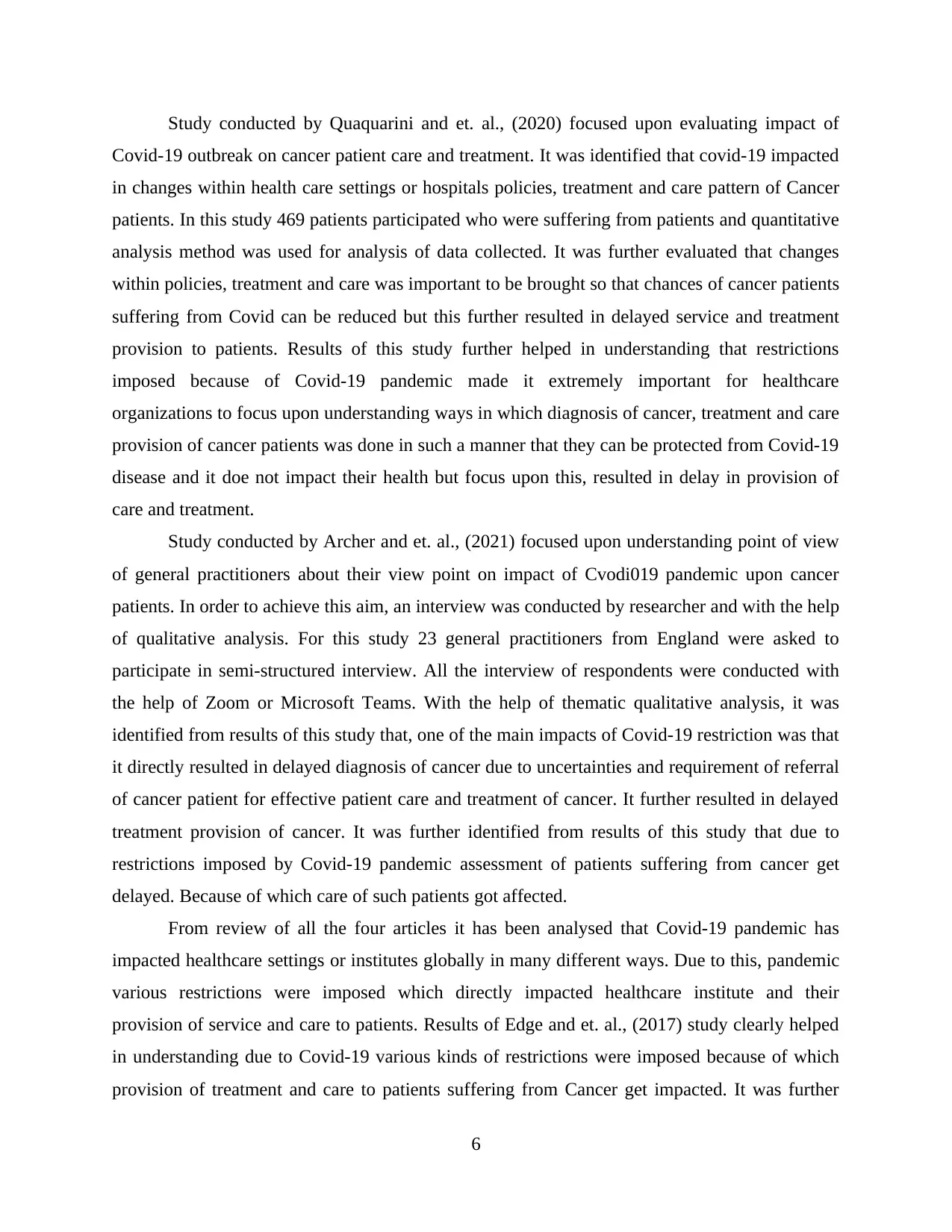
Study conducted by Quaquarini and et. al., (2020) focused upon evaluating impact of
Covid-19 outbreak on cancer patient care and treatment. It was identified that covid-19 impacted
in changes within health care settings or hospitals policies, treatment and care pattern of Cancer
patients. In this study 469 patients participated who were suffering from patients and quantitative
analysis method was used for analysis of data collected. It was further evaluated that changes
within policies, treatment and care was important to be brought so that chances of cancer patients
suffering from Covid can be reduced but this further resulted in delayed service and treatment
provision to patients. Results of this study further helped in understanding that restrictions
imposed because of Covid-19 pandemic made it extremely important for healthcare
organizations to focus upon understanding ways in which diagnosis of cancer, treatment and care
provision of cancer patients was done in such a manner that they can be protected from Covid-19
disease and it doe not impact their health but focus upon this, resulted in delay in provision of
care and treatment.
Study conducted by Archer and et. al., (2021) focused upon understanding point of view
of general practitioners about their view point on impact of Cvodi019 pandemic upon cancer
patients. In order to achieve this aim, an interview was conducted by researcher and with the help
of qualitative analysis. For this study 23 general practitioners from England were asked to
participate in semi-structured interview. All the interview of respondents were conducted with
the help of Zoom or Microsoft Teams. With the help of thematic qualitative analysis, it was
identified from results of this study that, one of the main impacts of Covid-19 restriction was that
it directly resulted in delayed diagnosis of cancer due to uncertainties and requirement of referral
of cancer patient for effective patient care and treatment of cancer. It further resulted in delayed
treatment provision of cancer. It was further identified from results of this study that due to
restrictions imposed by Covid-19 pandemic assessment of patients suffering from cancer get
delayed. Because of which care of such patients got affected.
From review of all the four articles it has been analysed that Covid-19 pandemic has
impacted healthcare settings or institutes globally in many different ways. Due to this, pandemic
various restrictions were imposed which directly impacted healthcare institute and their
provision of service and care to patients. Results of Edge and et. al., (2017) study clearly helped
in understanding due to Covid-19 various kinds of restrictions were imposed because of which
provision of treatment and care to patients suffering from Cancer get impacted. It was further
6
Covid-19 outbreak on cancer patient care and treatment. It was identified that covid-19 impacted
in changes within health care settings or hospitals policies, treatment and care pattern of Cancer
patients. In this study 469 patients participated who were suffering from patients and quantitative
analysis method was used for analysis of data collected. It was further evaluated that changes
within policies, treatment and care was important to be brought so that chances of cancer patients
suffering from Covid can be reduced but this further resulted in delayed service and treatment
provision to patients. Results of this study further helped in understanding that restrictions
imposed because of Covid-19 pandemic made it extremely important for healthcare
organizations to focus upon understanding ways in which diagnosis of cancer, treatment and care
provision of cancer patients was done in such a manner that they can be protected from Covid-19
disease and it doe not impact their health but focus upon this, resulted in delay in provision of
care and treatment.
Study conducted by Archer and et. al., (2021) focused upon understanding point of view
of general practitioners about their view point on impact of Cvodi019 pandemic upon cancer
patients. In order to achieve this aim, an interview was conducted by researcher and with the help
of qualitative analysis. For this study 23 general practitioners from England were asked to
participate in semi-structured interview. All the interview of respondents were conducted with
the help of Zoom or Microsoft Teams. With the help of thematic qualitative analysis, it was
identified from results of this study that, one of the main impacts of Covid-19 restriction was that
it directly resulted in delayed diagnosis of cancer due to uncertainties and requirement of referral
of cancer patient for effective patient care and treatment of cancer. It further resulted in delayed
treatment provision of cancer. It was further identified from results of this study that due to
restrictions imposed by Covid-19 pandemic assessment of patients suffering from cancer get
delayed. Because of which care of such patients got affected.
From review of all the four articles it has been analysed that Covid-19 pandemic has
impacted healthcare settings or institutes globally in many different ways. Due to this, pandemic
various restrictions were imposed which directly impacted healthcare institute and their
provision of service and care to patients. Results of Edge and et. al., (2017) study clearly helped
in understanding due to Covid-19 various kinds of restrictions were imposed because of which
provision of treatment and care to patients suffering from Cancer get impacted. It was further
6
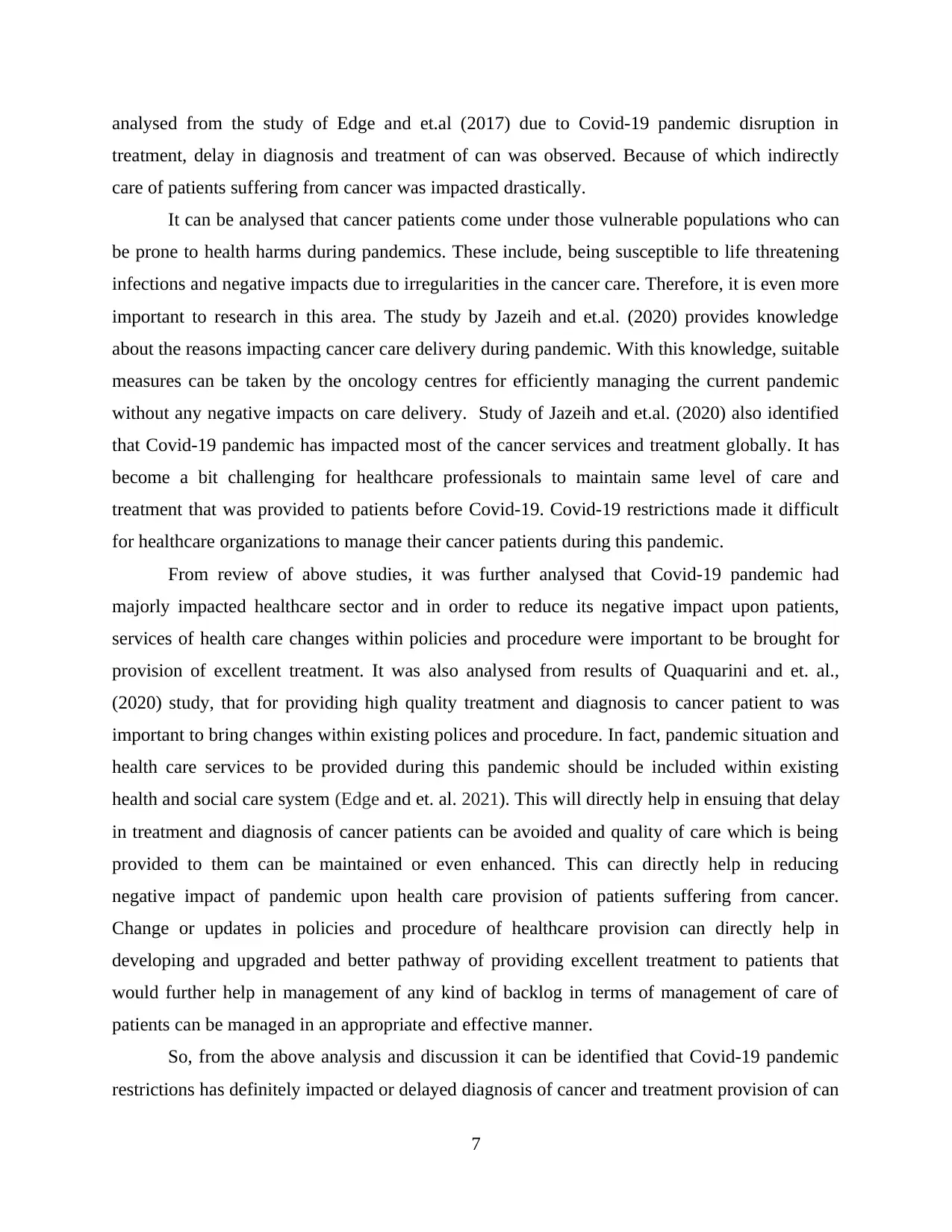
analysed from the study of Edge and et.al (2017) due to Covid-19 pandemic disruption in
treatment, delay in diagnosis and treatment of can was observed. Because of which indirectly
care of patients suffering from cancer was impacted drastically.
It can be analysed that cancer patients come under those vulnerable populations who can
be prone to health harms during pandemics. These include, being susceptible to life threatening
infections and negative impacts due to irregularities in the cancer care. Therefore, it is even more
important to research in this area. The study by Jazeih and et.al. (2020) provides knowledge
about the reasons impacting cancer care delivery during pandemic. With this knowledge, suitable
measures can be taken by the oncology centres for efficiently managing the current pandemic
without any negative impacts on care delivery. Study of Jazeih and et.al. (2020) also identified
that Covid-19 pandemic has impacted most of the cancer services and treatment globally. It has
become a bit challenging for healthcare professionals to maintain same level of care and
treatment that was provided to patients before Covid-19. Covid-19 restrictions made it difficult
for healthcare organizations to manage their cancer patients during this pandemic.
From review of above studies, it was further analysed that Covid-19 pandemic had
majorly impacted healthcare sector and in order to reduce its negative impact upon patients,
services of health care changes within policies and procedure were important to be brought for
provision of excellent treatment. It was also analysed from results of Quaquarini and et. al.,
(2020) study, that for providing high quality treatment and diagnosis to cancer patient to was
important to bring changes within existing polices and procedure. In fact, pandemic situation and
health care services to be provided during this pandemic should be included within existing
health and social care system (Edge and et. al. 2021). This will directly help in ensuing that delay
in treatment and diagnosis of cancer patients can be avoided and quality of care which is being
provided to them can be maintained or even enhanced. This can directly help in reducing
negative impact of pandemic upon health care provision of patients suffering from cancer.
Change or updates in policies and procedure of healthcare provision can directly help in
developing and upgraded and better pathway of providing excellent treatment to patients that
would further help in management of any kind of backlog in terms of management of care of
patients can be managed in an appropriate and effective manner.
So, from the above analysis and discussion it can be identified that Covid-19 pandemic
restrictions has definitely impacted or delayed diagnosis of cancer and treatment provision of can
7
treatment, delay in diagnosis and treatment of can was observed. Because of which indirectly
care of patients suffering from cancer was impacted drastically.
It can be analysed that cancer patients come under those vulnerable populations who can
be prone to health harms during pandemics. These include, being susceptible to life threatening
infections and negative impacts due to irregularities in the cancer care. Therefore, it is even more
important to research in this area. The study by Jazeih and et.al. (2020) provides knowledge
about the reasons impacting cancer care delivery during pandemic. With this knowledge, suitable
measures can be taken by the oncology centres for efficiently managing the current pandemic
without any negative impacts on care delivery. Study of Jazeih and et.al. (2020) also identified
that Covid-19 pandemic has impacted most of the cancer services and treatment globally. It has
become a bit challenging for healthcare professionals to maintain same level of care and
treatment that was provided to patients before Covid-19. Covid-19 restrictions made it difficult
for healthcare organizations to manage their cancer patients during this pandemic.
From review of above studies, it was further analysed that Covid-19 pandemic had
majorly impacted healthcare sector and in order to reduce its negative impact upon patients,
services of health care changes within policies and procedure were important to be brought for
provision of excellent treatment. It was also analysed from results of Quaquarini and et. al.,
(2020) study, that for providing high quality treatment and diagnosis to cancer patient to was
important to bring changes within existing polices and procedure. In fact, pandemic situation and
health care services to be provided during this pandemic should be included within existing
health and social care system (Edge and et. al. 2021). This will directly help in ensuing that delay
in treatment and diagnosis of cancer patients can be avoided and quality of care which is being
provided to them can be maintained or even enhanced. This can directly help in reducing
negative impact of pandemic upon health care provision of patients suffering from cancer.
Change or updates in policies and procedure of healthcare provision can directly help in
developing and upgraded and better pathway of providing excellent treatment to patients that
would further help in management of any kind of backlog in terms of management of care of
patients can be managed in an appropriate and effective manner.
So, from the above analysis and discussion it can be identified that Covid-19 pandemic
restrictions has definitely impacted or delayed diagnosis of cancer and treatment provision of can
7
⊘ This is a preview!⊘
Do you want full access?
Subscribe today to unlock all pages.

Trusted by 1+ million students worldwide
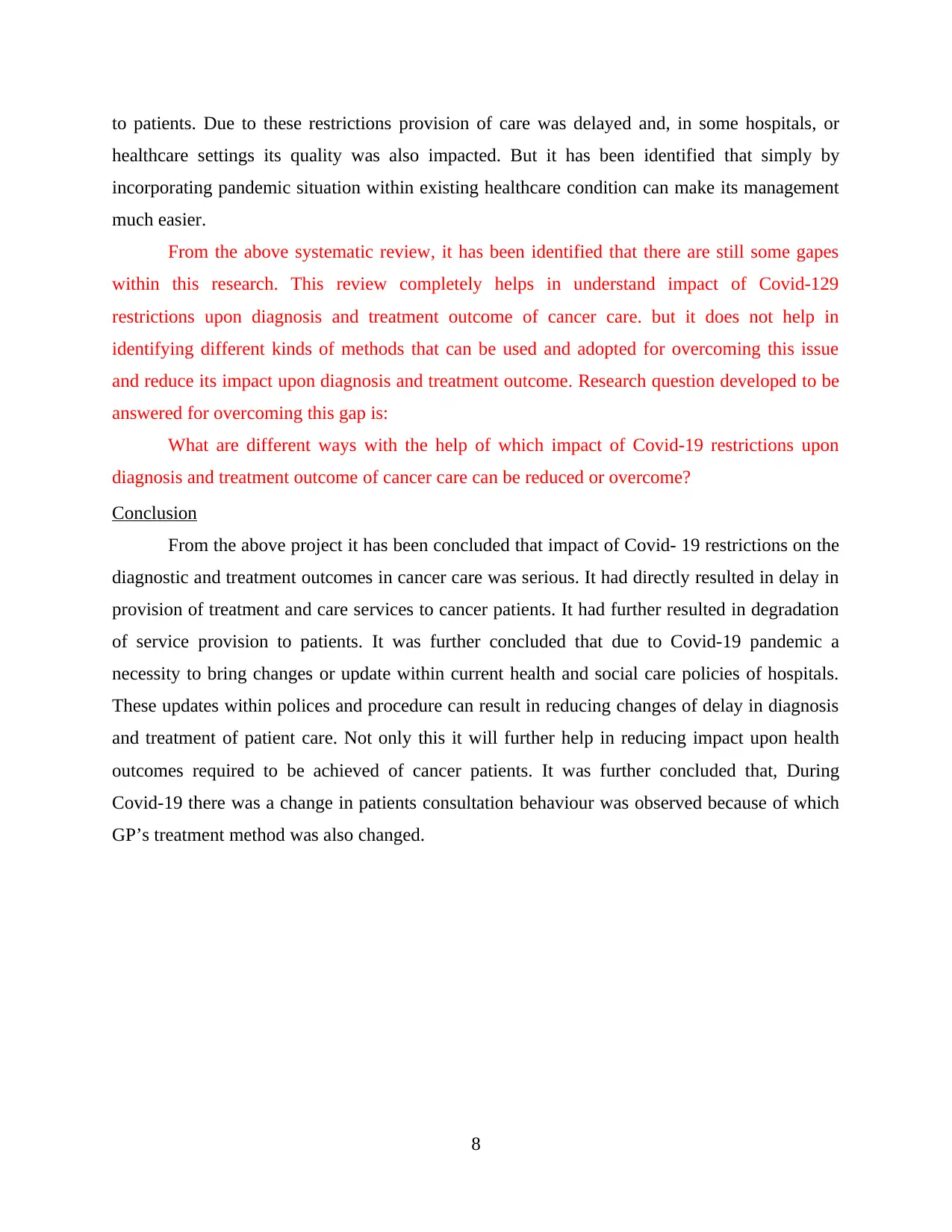
to patients. Due to these restrictions provision of care was delayed and, in some hospitals, or
healthcare settings its quality was also impacted. But it has been identified that simply by
incorporating pandemic situation within existing healthcare condition can make its management
much easier.
From the above systematic review, it has been identified that there are still some gapes
within this research. This review completely helps in understand impact of Covid-129
restrictions upon diagnosis and treatment outcome of cancer care. but it does not help in
identifying different kinds of methods that can be used and adopted for overcoming this issue
and reduce its impact upon diagnosis and treatment outcome. Research question developed to be
answered for overcoming this gap is:
What are different ways with the help of which impact of Covid-19 restrictions upon
diagnosis and treatment outcome of cancer care can be reduced or overcome?
Conclusion
From the above project it has been concluded that impact of Covid- 19 restrictions on the
diagnostic and treatment outcomes in cancer care was serious. It had directly resulted in delay in
provision of treatment and care services to cancer patients. It had further resulted in degradation
of service provision to patients. It was further concluded that due to Covid-19 pandemic a
necessity to bring changes or update within current health and social care policies of hospitals.
These updates within polices and procedure can result in reducing changes of delay in diagnosis
and treatment of patient care. Not only this it will further help in reducing impact upon health
outcomes required to be achieved of cancer patients. It was further concluded that, During
Covid-19 there was a change in patients consultation behaviour was observed because of which
GP’s treatment method was also changed.
8
healthcare settings its quality was also impacted. But it has been identified that simply by
incorporating pandemic situation within existing healthcare condition can make its management
much easier.
From the above systematic review, it has been identified that there are still some gapes
within this research. This review completely helps in understand impact of Covid-129
restrictions upon diagnosis and treatment outcome of cancer care. but it does not help in
identifying different kinds of methods that can be used and adopted for overcoming this issue
and reduce its impact upon diagnosis and treatment outcome. Research question developed to be
answered for overcoming this gap is:
What are different ways with the help of which impact of Covid-19 restrictions upon
diagnosis and treatment outcome of cancer care can be reduced or overcome?
Conclusion
From the above project it has been concluded that impact of Covid- 19 restrictions on the
diagnostic and treatment outcomes in cancer care was serious. It had directly resulted in delay in
provision of treatment and care services to cancer patients. It had further resulted in degradation
of service provision to patients. It was further concluded that due to Covid-19 pandemic a
necessity to bring changes or update within current health and social care policies of hospitals.
These updates within polices and procedure can result in reducing changes of delay in diagnosis
and treatment of patient care. Not only this it will further help in reducing impact upon health
outcomes required to be achieved of cancer patients. It was further concluded that, During
Covid-19 there was a change in patients consultation behaviour was observed because of which
GP’s treatment method was also changed.
8
Paraphrase This Document
Need a fresh take? Get an instant paraphrase of this document with our AI Paraphraser
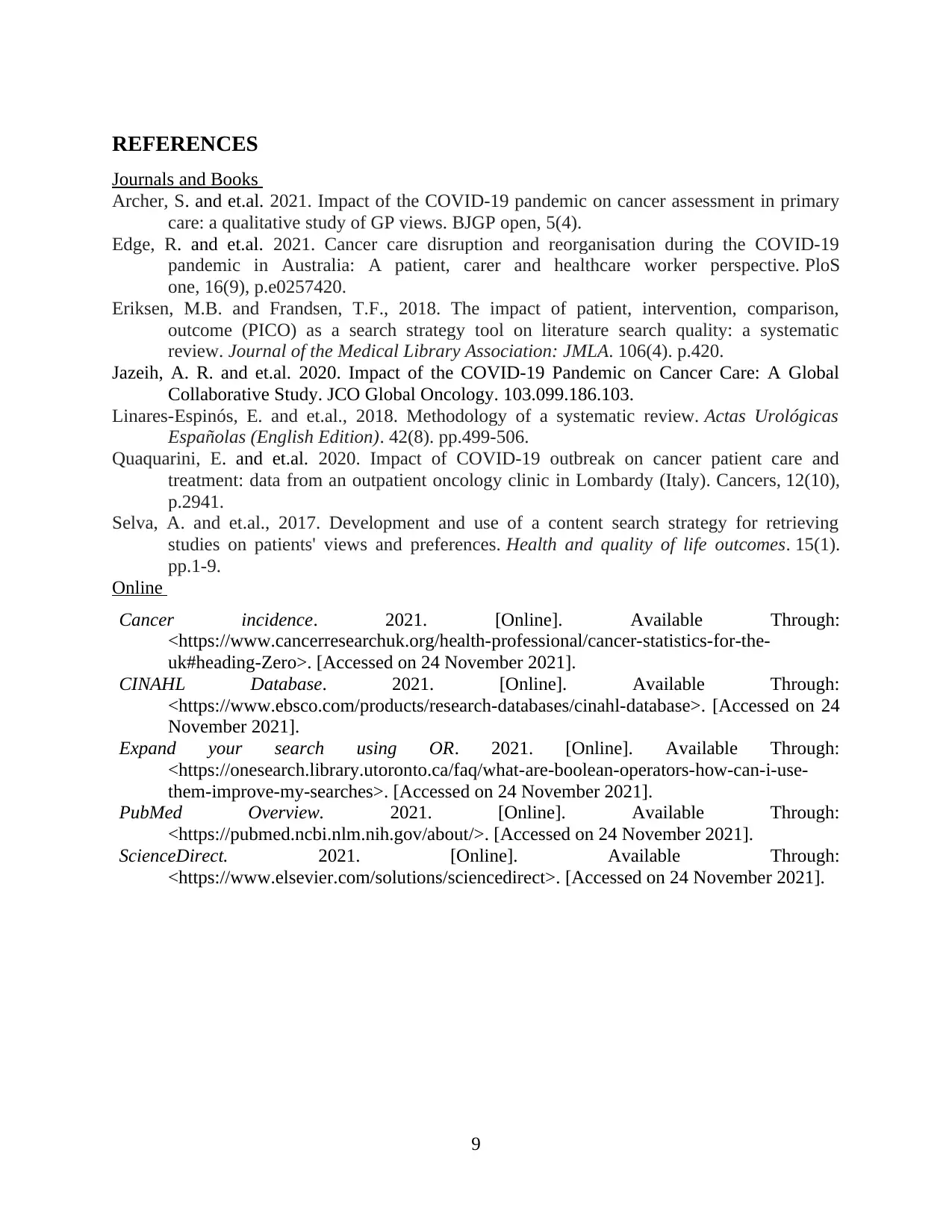
REFERENCES
Journals and Books
Archer, S. and et.al. 2021. Impact of the COVID-19 pandemic on cancer assessment in primary
care: a qualitative study of GP views. BJGP open, 5(4).
Edge, R. and et.al. 2021. Cancer care disruption and reorganisation during the COVID-19
pandemic in Australia: A patient, carer and healthcare worker perspective. PloS
one, 16(9), p.e0257420.
Eriksen, M.B. and Frandsen, T.F., 2018. The impact of patient, intervention, comparison,
outcome (PICO) as a search strategy tool on literature search quality: a systematic
review. Journal of the Medical Library Association: JMLA. 106(4). p.420.
Jazeih, A. R. and et.al. 2020. Impact of the COVID-19 Pandemic on Cancer Care: A Global
Collaborative Study. JCO Global Oncology. 103.099.186.103.
Linares-Espinós, E. and et.al., 2018. Methodology of a systematic review. Actas Urológicas
Españolas (English Edition). 42(8). pp.499-506.
Quaquarini, E. and et.al. 2020. Impact of COVID-19 outbreak on cancer patient care and
treatment: data from an outpatient oncology clinic in Lombardy (Italy). Cancers, 12(10),
p.2941.
Selva, A. and et.al., 2017. Development and use of a content search strategy for retrieving
studies on patients' views and preferences. Health and quality of life outcomes. 15(1).
pp.1-9.
Online
Cancer incidence. 2021. [Online]. Available Through:
<https://www.cancerresearchuk.org/health-professional/cancer-statistics-for-the-
uk#heading-Zero>. [Accessed on 24 November 2021].
CINAHL Database. 2021. [Online]. Available Through:
<https://www.ebsco.com/products/research-databases/cinahl-database>. [Accessed on 24
November 2021].
Expand your search using OR. 2021. [Online]. Available Through:
<https://onesearch.library.utoronto.ca/faq/what-are-boolean-operators-how-can-i-use-
them-improve-my-searches>. [Accessed on 24 November 2021].
PubMed Overview. 2021. [Online]. Available Through:
<https://pubmed.ncbi.nlm.nih.gov/about/>. [Accessed on 24 November 2021].
ScienceDirect. 2021. [Online]. Available Through:
<https://www.elsevier.com/solutions/sciencedirect>. [Accessed on 24 November 2021].
9
Journals and Books
Archer, S. and et.al. 2021. Impact of the COVID-19 pandemic on cancer assessment in primary
care: a qualitative study of GP views. BJGP open, 5(4).
Edge, R. and et.al. 2021. Cancer care disruption and reorganisation during the COVID-19
pandemic in Australia: A patient, carer and healthcare worker perspective. PloS
one, 16(9), p.e0257420.
Eriksen, M.B. and Frandsen, T.F., 2018. The impact of patient, intervention, comparison,
outcome (PICO) as a search strategy tool on literature search quality: a systematic
review. Journal of the Medical Library Association: JMLA. 106(4). p.420.
Jazeih, A. R. and et.al. 2020. Impact of the COVID-19 Pandemic on Cancer Care: A Global
Collaborative Study. JCO Global Oncology. 103.099.186.103.
Linares-Espinós, E. and et.al., 2018. Methodology of a systematic review. Actas Urológicas
Españolas (English Edition). 42(8). pp.499-506.
Quaquarini, E. and et.al. 2020. Impact of COVID-19 outbreak on cancer patient care and
treatment: data from an outpatient oncology clinic in Lombardy (Italy). Cancers, 12(10),
p.2941.
Selva, A. and et.al., 2017. Development and use of a content search strategy for retrieving
studies on patients' views and preferences. Health and quality of life outcomes. 15(1).
pp.1-9.
Online
Cancer incidence. 2021. [Online]. Available Through:
<https://www.cancerresearchuk.org/health-professional/cancer-statistics-for-the-
uk#heading-Zero>. [Accessed on 24 November 2021].
CINAHL Database. 2021. [Online]. Available Through:
<https://www.ebsco.com/products/research-databases/cinahl-database>. [Accessed on 24
November 2021].
Expand your search using OR. 2021. [Online]. Available Through:
<https://onesearch.library.utoronto.ca/faq/what-are-boolean-operators-how-can-i-use-
them-improve-my-searches>. [Accessed on 24 November 2021].
PubMed Overview. 2021. [Online]. Available Through:
<https://pubmed.ncbi.nlm.nih.gov/about/>. [Accessed on 24 November 2021].
ScienceDirect. 2021. [Online]. Available Through:
<https://www.elsevier.com/solutions/sciencedirect>. [Accessed on 24 November 2021].
9
1 out of 11
Related Documents
Your All-in-One AI-Powered Toolkit for Academic Success.
+13062052269
info@desklib.com
Available 24*7 on WhatsApp / Email
![[object Object]](/_next/static/media/star-bottom.7253800d.svg)
Unlock your academic potential
© 2024 | Zucol Services PVT LTD | All rights reserved.




